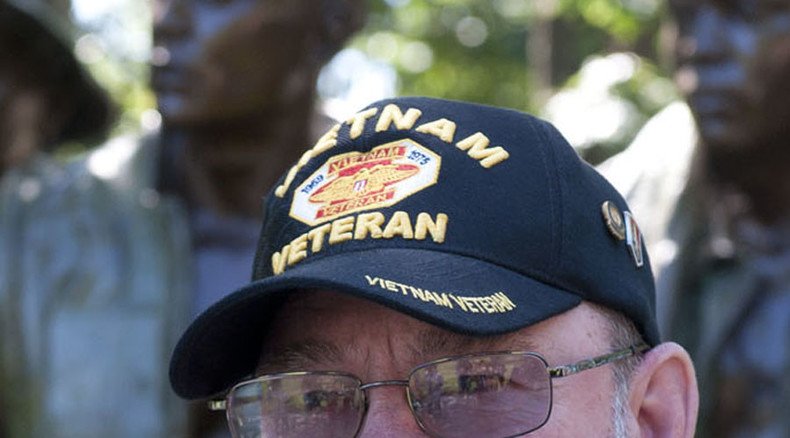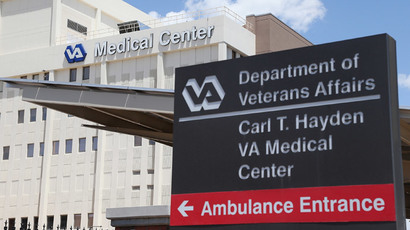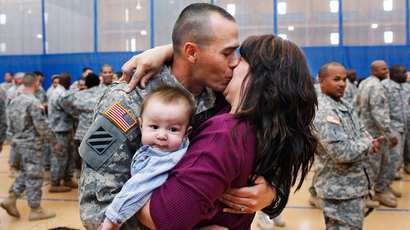VA hospital threw patient files in trash, kept quiet about it

A Veterans Affairs hospital in North Dakota dumped the personal data of 1,100 veterans during an office move, and waited two months to inform them about it. Critics are citing the incident as an example of mismanagement at the scandal-ridden agency.
Personal information – including names, Social Security numbers, phone numbers and addresses – of 1,000 veterans ended up in the trash in May, the Veterans Affairs Black Hills Healthcare System announced on Friday. The agency says the files were thrown out by mistake during a May 15 move at the Hot Springs campus. An employee noticed the box in the dumpster two days later, and the files were retrieved and secured by Veterans Affairs (VA) police.
Teresa Forbes, public affairs officer for the VA Black Hills, told the Rapid City Journal that the files were “part of a patient list generated for internal compliance purposes,” and did not contain the veterans’ medical data.
“The investigation found that during a regular office move, that the box of files were inadvertently thrown in the receptacle,” Forbes said. “It was just an unfortunate mistake during an office move.”
Asked why the agency waited almost ten weeks to send out a notice, Forbes said that “VA Black Hills worked within the time frames set by our policies to ensure the investigation was thorough, all affected veterans were identified, and resources put in place to assist veterans.”
An internal investigation did not determine which employee was at fault.
Files of 1,100 #veterans thrown in dumpster in #HotSprings, #Virginia - via @RCJournalhttp://t.co/mL55TJMrnU#VAfailpic.twitter.com/gYOEZlXdk6
— ConcernedVetsSC (@ConcernedVetsSC) August 3, 2015Due to the fact that the files remained in the dumpster on the campus until they were retrieved, the VA is “very confident that we don’t anticipate that their information has been targeted or will be misused,” Forbes told the newspaper.
Following agency protocols and policies, the VA sent a letter to the 1,100 veterans affected by the security lapse, offering them options to check on the integrity of their personal information. The three options proposed in the letter are to obtain a credit report from one of the national reporting agencies, enroll in an identity theft monitoring service program managed by a VA corporate partner, or place a fraud alert on their credit reports. The latter “could also delay the process when you seek to obtain credit,” the VA letter noted.
Senator John Thune, a South Dakota Republican, has blasted the incident as a case of "gross mismanagement." The dumpster incident was “unfortunately illustrative of the continued decline of the Hot Springs VA and the indifference shown to it by the Veterans Administration,” Thune said in a statement Friday.
“Congress should pass additional VA accountability measures," Thune added, "and the Black Hills VA leadership needs to focus on restoring, not degrading, our Hot Springs VA.”
The Black Hills VA is based in Fort Meade, South Dakota and serves 19,000 veterans residing in South Dakota, Montana, Nebraska, North Dakota, and Wyoming.
Last year, whistleblowers revealed that Veterans Affairs hospitals have manipulated patient waiting lists, which caused the deaths of seriously ill veterans. An agency report linked 23 of the reported 40 deaths in multiple states to delayed treatment.
Another investigation found thousands of claims collecting dust in filing cabinets for years, while potential recipients passed away.
The VA provides $95 billion worth of entitlements each year, including healthcare, education and training, disability money, pensions to veterans and their surviving spouses, and burial benefits. According to the agency’s own figures from 2008, of the 23.4 million military veterans, only 8.5 million – 36 percent – were receiving benefits and services.














